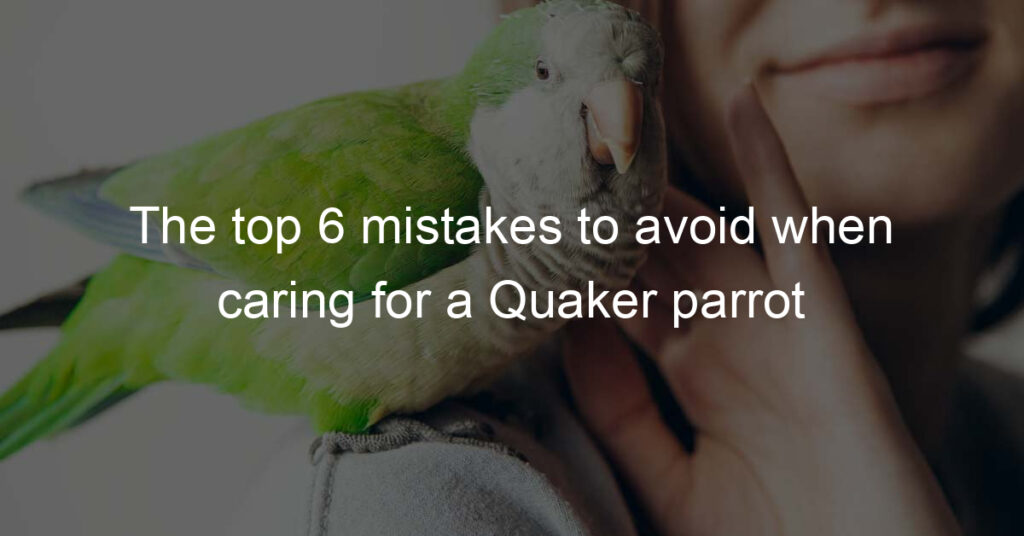As any pet lover knows, taking care of a Quaker parrot is a big responsibility. These beautiful and sometimes feisty creatures need lots of love and attention, and there are some common mistakes that new bird owners often make. In this blog post, we’ll explore the top 10 mistakes to avoid when caring for your Quaker parrot.
From overfeeding to neglecting their mental stimulation needs, these are surefire ways to make your feathered friend unhappy. So read on, and take good notes! Your Quaker parrot will thank you for it.
1. Don’t assume that your Quaker parrot will be content in a small cage – they need plenty of space to move around
2. Quaker parrots are very social creatures, so don’t neglect them or they will become depressed
3. Make sure to give your Quaker parrot a variety of food, not just seeds and pellets
4. Avoid using toxic chemicals around the house if you have a Quaker parrot – they are very sensitive to fumes
5. Don’t let your Quaker parrot out of its cage without supervision – they can get into mischief quickly!
6. Keep an eye on your Quaker parrot’s nails and beak, and trim them regularly if necessary
What are tips for Quaker Parrots?
Owning a Quaker parrot can be a fun, rewarding experience. These birds are intelligent, and social, and need to stay stimulated in order to thrive. To make the most of your relationship with your Quaker parrot you should provide them with lots of perching spots that challenge its motor skills with different shapes and textures to encourage movement.
Make sure that they have a variety of toys that can be rotated regularly so they don’t get bored of the same ones all the time. Most importantly schedule regular playtime with your bird so they can reap the full mental and physical benefits of socialization. By following these tips, you’ll ensure that your Quaker parrot is happy and content while living in its new environment!
How do I get my Quaker Parrot to trust me?
Building trust between you and your Quaker Parrot can take time, but the effort is worthwhile. The key is patience and consistency; create a daily routine and stick to it so your bird knows what to expect. Spend plenty of quality time with your parrot each day, doing simple things like holding them or petting their feathers.
Research how to hand-tame your parrot – this includes shining a light on their beak as they step up onto your finger – because the more comfortable they are in interacting with you, the stronger their bond with you will become.
Have treats with you while working on taming them and remember to end the session positively! With positive reinforcement, patience, and consistency, gradually your Quaker Parrot will learn that you aren’t a threat and look forward to being around you.
Where can I not touch my parrot?
Parrots are beautiful and fun pets, but there are some parts of their body that should never be touched. Generally speaking, it’s best to keep hands away from their head and wings. Parrots use their wings for balance, so handling them might cause them stress and discomfort. Their head is also an area you want to avoid because it contains sensitive pulses and feathers may become plucked if touched too frequently in the same areas.
An exception to this rule is when your parrot is molting or receptive; then gently brushing with a soft toothbrush may be recommended if advised by a professional avian veterinarian. But always stay mindful of where not to touch your feathered friend – the safest way to handle your parrot right is not at all!
What is toxic to parrots?
Parrots are incredibly intelligent and vibrant creatures, so it’s only natural we want to keep them as healthy and happy as possible. Unfortunately, there are many everyday items that can be toxic to parrots, from human medications and foods to items in their cages!
Chocolate and avocado in particular are two dangerous items for parrots because they contain toxins that can cause serious harm if ingested. Additionally, things like cigarettes, aerosol sprays, essential oils, and household cleaners have detrimental effects on these birds due to their sensitive respiratory systems and should never be used around them.
It’s important to always conduct your own research before introducing anything new into the house or their cage so you don’t put your feathered friends at risk of poisoning or illness.
The Bottom Line
In conclusion, like any pet, there are many aspects to consider when one has a Quaker parrot. By avoiding the top 10 mistakes listed in this blog post, one can ensure that their Quaker parrot enjoys a safe and comfortable life filled with enrichment, affection, and love. With just a little bit of extra effort, owners can go a long way toward providing the necessary care for their feathered friend.
Furthermore, educating yourself on the basic requirements of Quaker parrots is key to ensuring they live to their fullest potential. On the technical level – such as setting up suitable housing or researching appropriate foods – seek advice from experienced bird owners who understand your situation.
Moreover, don’t forget that these birds are social! Spend quality time interacting with them each day by building trust and forging bonds through positive reinforcement. Taking good care of your parrot will be well worth it: you’ll be rewarded generously with daily doses of joy and companionship!








